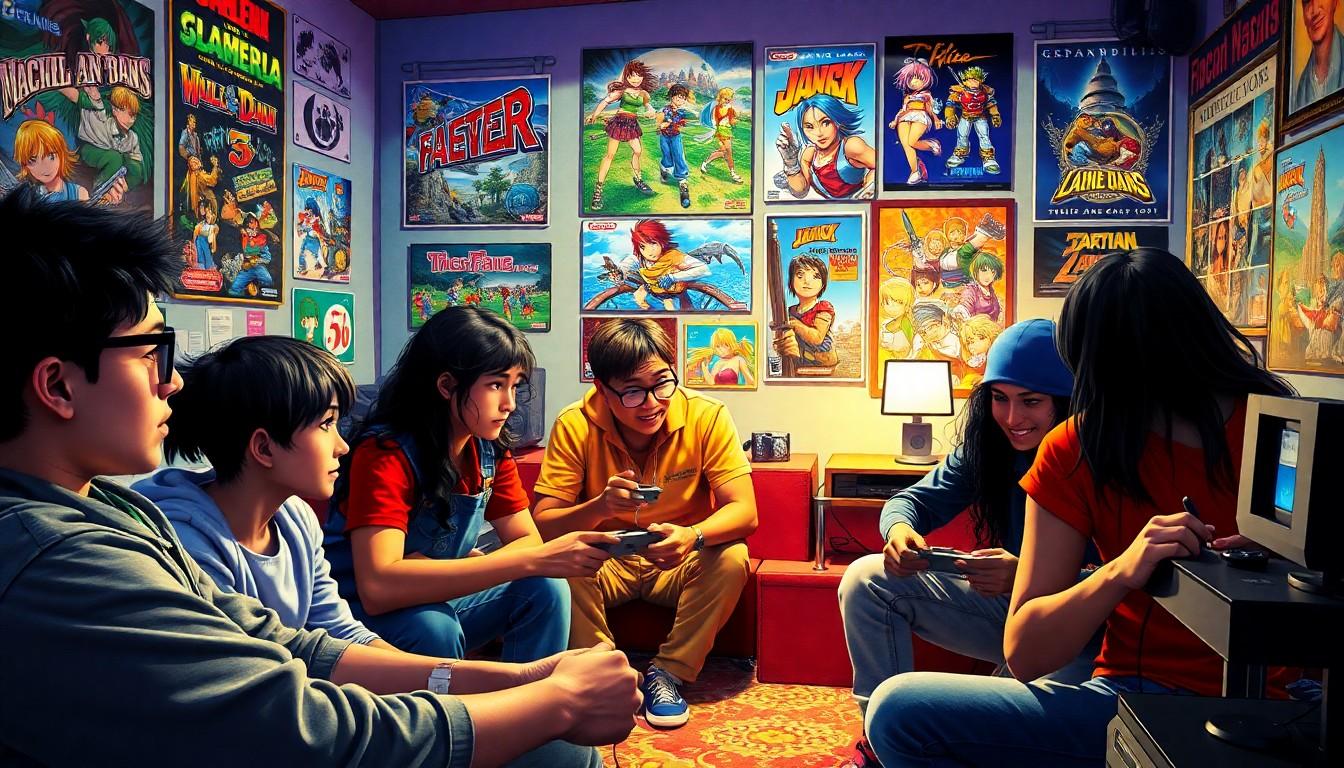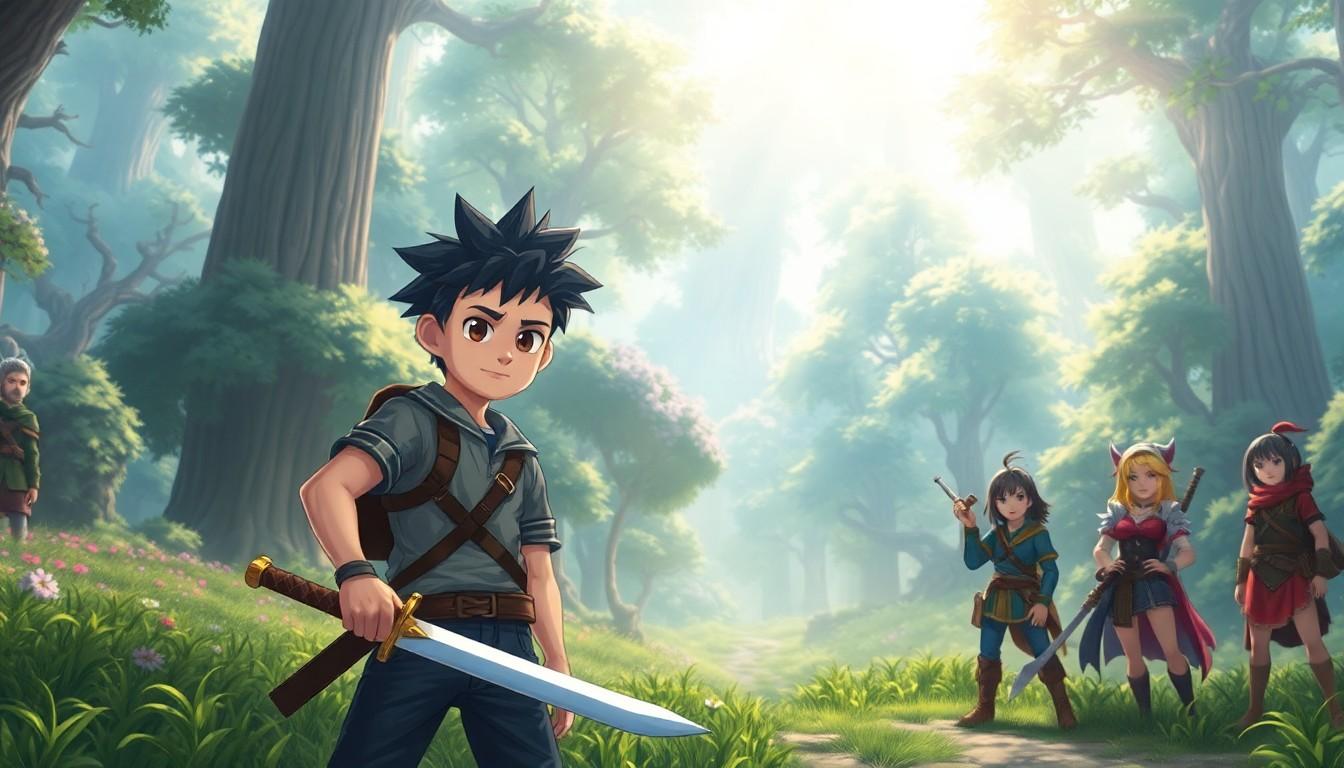In a world where dragons roam and heroes rise, Japanese RPGs stand out like a neon sign in a dark alley. With their captivating stories and unforgettable characters, these games whisk players away on epic adventures that often involve saving the world—or at least a small village. Who wouldn’t want to wield a sword larger than their character while engaging in turn-based battles that could rival a chess match in strategy?
From the whimsical landscapes of Final Fantasy to the intricate narratives of Persona, Japanese RPGs offer a unique blend of artistry and storytelling. They pull players into immersive worlds filled with unforgettable quests, quirky side characters, and a healthy dose of humor. So grab your controller and prepare for a journey that promises not just entertainment, but also a delightful escape from reality. After all, who needs a mundane life when you can be a hero in a pixelated paradise?
Table of Contents
ToggleOverview of Japanese RPGs
Japanese RPGs combine immersive storytelling with complex gameplay mechanics. Players engage in turn-based battles while developing character skills and abilities. Iconic titles like Final Fantasy and Persona serve as prime examples of the genre’s depth.
Quests unfold in richly designed worlds filled with vibrant characters. Each game offers unique artistic styles, contributing to a distinct visual experience. Players often forge emotional connections to characters through their struggles and growth.
Storylines usually explore themes of friendship, sacrifice, and self-discovery. Adding depth, many titles feature intricate plots that twist and turn, keeping players invested. World-building enhances the experience, with detailed lore and histories woven into the gameplay.
The soundtracks in Japanese RPGs are memorable, often composed by renowned artists. Music elevates gameplay, enhancing emotional moments and driving the narrative forward. Each score becomes a defining element, creating lasting impressions on players.
Multiplayer options in modern titles allow for social interactions, expanding the experience. Cooperative gameplay invites friends to join forces, enhancing the sense of adventure. These features reflect the genre’s evolution, adapting to modern gaming landscapes.
Overall, Japanese RPGs captivate audiences worldwide through their rich narratives and engaging gameplay. Enthusiasts appreciate the blend of artistry and storytelling, making these games a significant part of the gaming culture.
History of Japanese RPGs

Japanese RPGs emerged in the 1980s, influenced by Western tabletop games and early computer-based role-playing titles. These influences shaped the genre’s core mechanics and storytelling techniques, laying the foundation for future developments.
Early Influences
Influences from Western gaming culture played a pivotal role in the early years of Japanese RPGs. Dungeons & Dragons served as a significant inspiration for storytelling and character progression. Computer games like Wizardry and Ultima introduced turn-based mechanics and party systems that became staples in Japanese titles. The release of Dragon Quest in 1986 marked a turning point, establishing the JRPG formula while emphasizing narrative-driven gameplay. Developers sought to blend cinematic storytelling with engaging mechanics, resonating with a growing audience in Japan and beyond.
Evolution Through the Years
The evolution of Japanese RPGs reflects advancements in technology and player expectations. 16-bit consoles brought forth iconic titles such as Final Fantasy and Chrono Trigger, enhancing graphics and music while expanding narrative depth. The 1990s witnessed the genre diversify through darker themes in games like Final Fantasy VII and the introduction of fully 3D environments within titles such as Xenogears. The early 2000s saw franchises like Persona reshape character-driven storytelling, allowing players to explore social dynamics alongside combat. Modern iterations embrace online multiplayer features, enhancing social interactions within expansive worlds. Japanese RPGs continue to innovate, integrating new technologies to captivate audiences with rich narratives and complex gameplay.
Key Features of Japanese RPGs
Japanese RPGs excel in their captivating storytelling, character development, and strategic combat. The genre deeply immerses players in rich narratives and engaging gameplay.
Storytelling and Narrative
Storytelling forms the backbone of Japanese RPGs. Each game presents detailed plots that often explore complex themes like friendship and sacrifice. Players encounter memorable characters with unique backstories, driving emotional connections. Iconic titles like Final Fantasy and Persona employ cinematic storytelling techniques, enhancing the immersive experience. Additionally, expansive lore often unfolds through side quests, allowing for a deeper understanding of the game world.
Turn-Based Combat Systems
Turn-based combat systems define the strategic gameplay of many Japanese RPGs. Players engage in calculated battles, making thoughtful decisions to outsmart opponents. Each character has distinct abilities and roles, creating diverse combat scenarios. Game mechanics frequently feature elemental strengths and weaknesses, emphasizing tactical planning. Iconic titles showcase layered combat systems, appealing to players who enjoy mastering intricate strategies.
Character Development
Character development captivates players in Japanese RPGs. Players watch characters grow through skill upgrades and story progression. Customization options often vary from equipment choices to ability enhancements, allowing for personalized gameplay. Meaningful narratives reveal individual arcs, fostering strong connections with the characters. Emotional growth frequently mirrors players’ journeys, enhancing the overall experience.
Popular Japanese RPGs
Japanese RPGs capture players’ imaginations with their rich narratives and diverse gameplay. The following sections highlight iconic series and recent releases that showcase the genre’s continuing evolution.
Iconic Series
Final Fantasy remains a standout franchise, known for its evolving gameplay and emotional storytelling. Since 1987, players have explored numerous worlds and encountered unforgettable characters. Dragon Quest, hailed as a pioneer, established essential RPG mechanics and continues to influence the genre. The Persona series uniquely blends traditional RPG elements with life simulation, creating engaging character-driven experiences. Tales of series has developed a loyal following, featuring real-time combat and complex narratives. These franchises exemplify the quality and innovation that define Japanese RPGs.
Recent Releases
Recent titles like Persona 5 Royal have gained acclaim for their engaging gameplay and intricate narratives. The expansion of Xenoblade Chronicles 3 showcases vast open worlds filled with exploration and strategic battles. Nioh 2 offers a darker twist on the genre, incorporating action RPG elements while retaining traditional mechanics. Octopath Traveler presents a unique art style and a non-linear storytelling approach, attracting a new audience. Every new release continues to push boundaries, affirming Japanese RPGs’ position in the gaming landscape.
The Impact of Japanese RPGs on Gaming Culture
Japanese RPGs significantly shaped gaming culture worldwide. Iconic titles like Final Fantasy, Dragon Quest, and Persona set new standards for storytelling and gameplay. Players often engage deeply with rich narratives and thoughtfully crafted characters, fostering emotional connections that resonate beyond the screen.
Cultural influence is evident in various media forms, including anime and manga. Many Japanese RPGs inspire adaptations, drawing fans into the larger franchise universe. This interconnectedness enhances the allure of both the games and their narratives.
Innovative gameplay mechanics play a crucial role in player engagement. Turn-based combat systems encourage strategic thinking, requiring players to analyze each move and consider character abilities. Evolution in quality graphics and soundtracks amplifies the immersive experience, allowing players to fully absorb the story’s emotional weight.
Community involvement contributes to the genre’s vibrancy. Online multiplayer options enable players to share experiences and collaborate in gameplay, fostering friendships and discussions that extend beyond in-game interactions. Fan communities often create intricate fan art and theories, further enriching the overall experience.
The genre’s evolution continues with modern titles like Xenoblade Chronicles 3 and Octopath Traveler. These games push new boundaries with innovative mechanics and diverse narratives. They reflect the changing preferences of gamers while maintaining the core essence of Japanese RPG traditions.
Overall, Japanese RPGs have become a cultural mainstay, influencing not only video games but also artistry and storytelling in broader entertainment fields. Their impact resonates, offering unique experiences that captivate audiences and strengthen a dedicated gaming community.
Conclusion
Japanese RPGs stand as a testament to the power of storytelling and artistry in gaming. With their rich narratives and unforgettable characters they create immersive worlds that captivate players. The strategic gameplay and emotional depth resonate deeply with audiences fostering connections that transcend the screen.
As the genre continues to evolve it remains a vital part of gaming culture influencing not just other games but also anime and manga. The innovations seen in recent titles ensure that Japanese RPGs will keep enchanting players for years to come inviting them to embark on new adventures filled with wonder and discovery.



